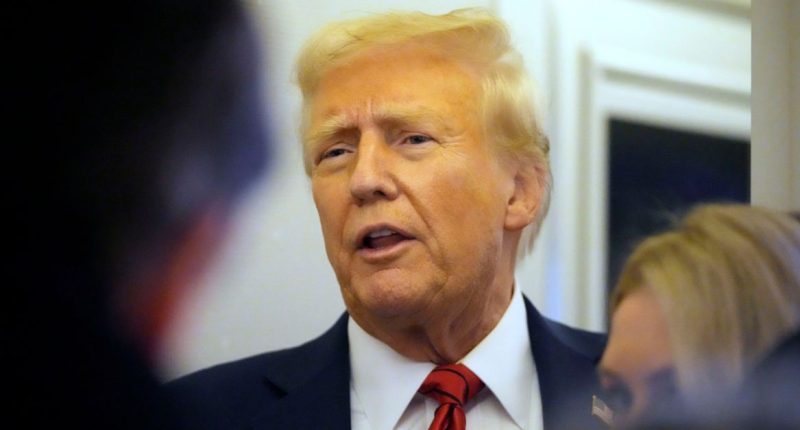
President Donald Trump speaks to reporters aboard Air Force One en route from Miami to Joint Base Andrews, Md., Monday, Jan. 27, 2025. (AP Photo/Mark Schiefelbein)
A federal judge in Rhode Island has barred the Trump administration from enforcing its murky and controversial federal spending freeze by issuing a temporary restraining order.
Earlier this week, U.S. District Judge John McConnell voiced his intention to likely rule in favor of the restraining order during a hearing. On Friday, the court issued a 13-page order formalizing that opinion.
“The Court finds that the record now before it substantiates the likelihood of a successful claim that the Executive’s actions violate the Constitution and statutes of the United States,” McConnell writes.
The Office of Management and Budget issued the memo in question on Tuesday — an attempt to make good on a series of executive orders issued by President Donald Trump, which outlined spending priorities. Within hours, the federal government lurched into chaos.
In response to the specter of frozen entitlement systems, downed websites, and a general state of panic across administrative agencies, the administration quickly performed a volte-face and rescinded the OMB memo with a terse second memo that also directed employees to follow up with agency lawyers if they had any questions.
That quick rescission, the government argued, rendered all of the multiple lawsuits filed against the spending freeze moot.
Not so, said the judge.
“The Defendants now claim that this matter is moot because it rescinded the OMB Directive,” the Friday order reads. “But the evidence shows that the alleged rescission of the OMB Directive was in name-only and may have been issued simply to defeat the jurisdiction of the courts. The substantive effect of the directive carries on.”
In his comments from the bench, McConnell took note of an X post by White House press secretary Karoline Leavitt in which she cast doubt on the efficacy of the second OMB memo to do away with the first memo.
“This is NOT a rescission of the federal funding freeze,” Leavitt wrote. “It is simply a rescission of the OMB memo. Why? To end any confusion created by the court’s injunction. The President’s EO’s on federal funding remain in full force and effect, and will be rigorously implemented.”
In Friday’s order, the judge cited the press secretary’s post, and an Environmental Protection Agency email sent Wednesday purporting to implement the original OMB directive by pausing all disbursements as evidence that the memo lives on.
“Based on the Press Secretary’s unequivocal statement and the continued actions of Executive agencies, the Court finds that the policies in the OMB Directive that the States challenge here are still in full force and effect, and thus the issues presented in the States’ TRO motion are not moot,” the order reads.
The judge also expressed severe doubt as to the upshot of the administration’s actions after the initial kerfuffle.
From the court’s order, at length:
In response to this lawsuit and the Court’s stay order, they say they have rescinded Memo M-25-13 and ceased the allegedly unlawful conduct. But basic principles of voluntary cessation make clear that alone is not enough to thwart this Court’s jurisdiction (let alone evade its administrative stay). Particularly in light of the government’s shifting actions and explanations with respect to the funding freeze, Plaintiffs can have no assurances that the government will not simply resume implementing and enforcing the challenged policy going forward — assuming they fully stopped at all.
Instead, McConnell says, the Trump administration is just playing a shell game with the law, policy, and the OMB memos — citing the Leavitt post as proof of an attempt at “manipulation.”
“It has said that, notwithstanding the Court’s stay and the purported ‘rescission,’ the freeze of Federal funds announced in Memo M-25-13 remains in effect, and the only purpose of the ‘rescission’ was ‘to end any confusion’ about the Court’s order,” the judge goes on. “The Court should not brook the government’s transparent efforts to evade the force and effect of its stay order or thwart its jurisdiction to resolve this continuing dispute.”
In issuing the formal temporary restraining order, the court mused that the state plaintiffs are likely to prevail on their claims as the litigation moves through the court system.
Key to the judge’s ruling is a finding that the Trump administration’s spending freeze constitutes both a violation of the U.S. Constitution and longstanding federal law, namely, the Administrative Procedure Act (APA), which often blocks an administrative agency’s action when it can be shown that what the government is doing is “arbitrary and capricious.”
“Congress appropriated many of these funds, and the Executive’s refusal to disburse them is contrary to congressional intent and directive and thus arbitrary and capricious,” the order reads. “Congress has not given the Executive limitless power to broadly and indefinitely pause all funds that it has expressly directed to specific recipients and purposes and therefore the Executive’s actions violate the separation of powers.”
More Law&Crime coverage: ‘No jurisdiction’: DOJ says Trump’s executive orders ‘are not subject to challenge’ in lawsuit over funding freeze on federal aid
While this is the second time McConnell has ruled against the would-be government spending freeze, McConnell himself is at least the second federal judge to do so.
On Wednesday morning, Washington, D.C.-based U.S. District Judge Loren AliKhan issued an administrative stay blocking the policy, a less intrusive manner of pushing back on the administration’s plans.
In the Rhode Island case, New York State is the lead plaintiff. After McConnell issued his ruling, New York Attorney General Letitia James, a Democrat, issued a press release hailing the court’s decision.
“This administration’s reckless plan to block federal funding has already caused chaos, confusion, and conflict throughout our country,” James said in a statement. “In the short time since this policy was announced, families have been cut off from childcare services, essential Medicaid funds were disrupted, and critical law enforcement efforts were put in jeopardy. I led a coalition of attorneys general in suing to stop this cruel policy, and today we won a court order to stop it. The President cannot unilaterally halt congressional spending commitments. I will continue to fight against these illegal cuts and protect essential services that New Yorkers and millions of Americans across the country depend on.”








